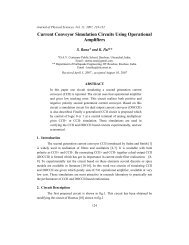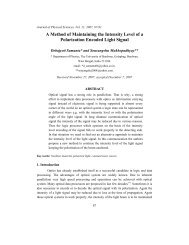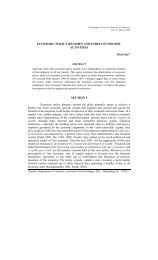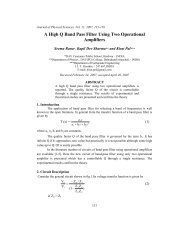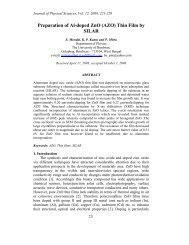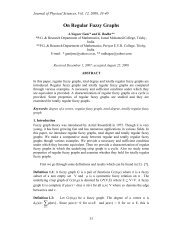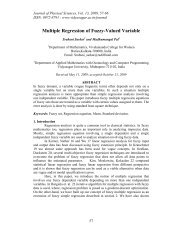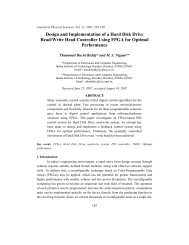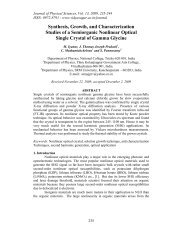VIDYASAGAR UNIVERSITY JOURNAL OF COMMERCE
VIDYASAGAR UNIVERSITY JOURNAL OF COMMERCE
VIDYASAGAR UNIVERSITY JOURNAL OF COMMERCE
Create successful ePaper yourself
Turn your PDF publications into a flip-book with our unique Google optimized e-Paper software.
CORPORATE GOVERNANCE AND TRANSPARENCY SCENARIO IN ASIA<br />
tendency and ability of senior managers to put their personal interests above those of the<br />
company’s shareholders and stakeholders. It is the responsibility of the board of directors, in<br />
fact, to ensure ‘good’ CG. This involves a set of relationships between the management of a<br />
corporation, its board, its shareholders and other relevant stakeholders. Accordingly, the<br />
board must agree on the corporation’s purpose (what it is for), its ethical values (what it<br />
stands for), and the strategy to achieve its purpose. In the practical sense, CG involves the<br />
“nuts and bolts” of how corporations should fulfill their responsibilities to their shareholders<br />
and other stakeholders.<br />
“Good” CG requires that the board must govern the corporation with integrity and enterprise<br />
in a manner, which entrenches and enhances the ‘license’ it has to operate. This license is<br />
not only regulatory but embraces the corporation’s interaction with its shareholders and<br />
other stakeholders, such as, the communities in which it operates, bankers, other suppliers of<br />
finance and credit, customers, the media and public opinion makers and pressure groups.<br />
While the board is accountable to the owners of the corporation for achieving the corporate<br />
objective, its conduct in regard to factors, such as business ethics and the environment, for<br />
example, may have an impact on legitimate societal interests (stakeholders) and thereby<br />
influence the reputation and long-term interests of the business enterprise. However, an ideal<br />
governance structure should give management sufficient room to exercise their talent, while<br />
simultaneously controlling their behavior.<br />
During the 1990s, a number of high-profile corporate scandals (viz., Enron, WorldCom,<br />
Tyco, etc.) in the US and elsewhere (viz., Parmalat, Ahold, Alstom, etc.) triggered an indepth<br />
reflection on the ‘regulatory’ role of the government in protecting the interests of<br />
shareholders. The Enron scandal, for example, has sparked numerous debates on issues<br />
relating to transparency, accountability and disclosure. For the US—a strong proponent of<br />
transparency and good CG—a scandal like Enron is certainly an embarrassment. The energy<br />
giant surprised the market by announcing that it was forced to recognize losses of US$ 1.01<br />
billion. These losses were related to the unwinding of partnerships controlled by Enron’s<br />
CFO. As a result the company would eliminate more than US$1 billion in shareholder<br />
equity. This led to a securities class-action lawsuit on behalf of all persons who acquired<br />
Enron’s stock during 2000-01. “The lawsuit alleges that Enron’s management: (a) misled<br />
investors by failing to disclose material information about the company’s risk position, (b)<br />
issued false and misleading information to potential investors, and (c) disposed of over<br />
US$73 million of their stock to unsuspecting investors.” What transpired next was a<br />
corporate soap-opera: bankruptcy, suicide, political patronage, cronyism, more allegations<br />
and even more denials? Ferris et al., (2007) concludes as: “We find that the incidence of<br />
‘derivative’ lawsuits is higher for firms with a greater likelihood of “agency conflicts”.<br />
Derivative lawsuits are associated with significant improvements in the board of directors:<br />
the proportion of outside representation on the board increases.” To redress the problem of<br />
corporate misconduct, ensuring sound CG is believed to be essential to maintaining investor<br />
confidence and good performance.<br />
A growing number of empirical studies have demonstrated that good CG contributes to<br />
better investor protection (la Porta et al., 2000), lower costs of capital (Ashbaugh-Skaife et<br />
2 Vidyasagar University Journal of Commerce





